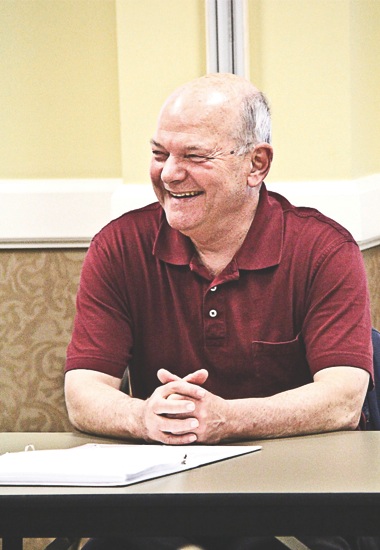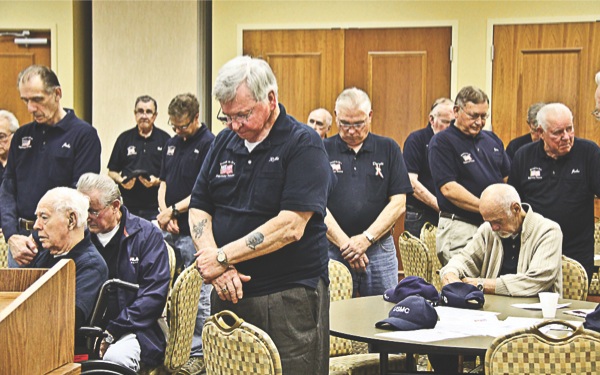EDGEWATER – Elgin Mayor David Kaptain spoke on a broad scope of news regarding Elgin at a meeting of the Edgewater Veterans group on May 2 at the Creekside Lodge.

Elgin Mayor David Kaptain spoke at a May 2 meeting of the Edgewater Veterans group. The mayor discussed a wide range of issues, including the decision to end Elgin’s senior rebate program. (Photo by Hannah Sturtecky/Sun Day)
He opened his talk with some notices pertinent to the veterans. First, the sad news of the burial of Alex Martinez, the first Elgin veteran to die in combat in the past 50 years. Martinez, a 21-year-old corporal, was killed in Afghanistan in April.
Next, Kaptain addressed the Elgin Veterans Memorial Park, which will have its waterfront design revealed at 4 p.m. on May 18. The project, which represents phase II of the park’s development, is set to cost between $62,000 and $67,000.
Several changes are coming to Elgin in the form of taxes. Among the first Kaptain discussed was the city’s property taxes.
“I said for five years that the property tax was unfair in Elgin,” Kaptain said. “It was too high, and the council for it has not touched property tax in 17 years. Because of the [Grand Victoria] riverboat, they left the multiplier the same, so every time your home value went up, your taxes went up.”
Elgin is on a five-year plan to reduce the city’s portion of property tax bills by 25 percent. In order to fulfill this plan, Kaptain explained Elgin will have to find funds elsewhere.
As part of Elgin’s $268.7 million budget enacted last December, Elgin will see a 3 percent tax on alcohol sales, a use-based electric utility tax, and a sales tax increase from .75 to 1.25 percent. Each of the tax increases will become effective July 1.
Kaptain said these new taxes are replacing what was originally taken from residents’ property taxes.
“I don’t like hiding things in the property tax; I want people to know what they’re paying for and where that money goes,” he said.
The increased sales tax is used to make up for funds formerly raised by the Grand Victoria Casino, whose revenue has been decreasing in recent years. Money raised from the tax will go toward a dedicated street improvement fund.
Kaptain criticized politicians for investing in roads only when they are up for re-election.
“I’m ending that,” he said. “We’re spending what’s in the sales tax, [and] I want to spend the same amount every year.”
Kaptain drew attention not only to city roads, but what runs beneath them. He told the audience that in some parts of Elgin, the sewers are over 100 years old and past their life expectancy.
“We have areas in town that are like Swiss cheese. And a lot of neighborhoods in town, it’s not the streets that fail, it’s the water that’s underneath,” he said.
A proposed storm-water utility tax would be used to pay for the sewer work.
Not all plans for Elgin have a low profile. Artspace is a project currently under construction in Downtown Elgin set to be complete this October. When finished, Artspace will be a 55-unit apartment space for artists on limited income. Kaptain credited the idea to former Elgin mayor Ed Schock.
“The reason I supported [Schock] is they did this in 30 other communities, and it worked 30 times; can’t do any better than that,” he said. “It improved the community; it improves the tax base; it takes a piece of property that was paying no taxes in the city of Elgin because it was owned by Elgin Community College, and now it’s going to pay tax back into the city.”
Another project in the works is the new Riverside Drive Promenade. The promenade would take the place of an old parking deck, offering a new roadway, pedestrian and bike paths, and a riverfront view to businesses.
The project, which has an estimated total cost of $13.05 million to $14.34 million, will be paid for by an $8 million grant from the Illinois Department of Commerce and Economic Opportunity and a $1 million grant from the Illinois Department of Natural Resources. The rest of the cost will be paid through money from Downtown Elgin’s tax increment financing district.
If Kaptain was going for a theme in his message to the group, it may have been that all Elginites must pull together to solve the city’s economic problems.
He told the group that this year’s $200 property tax rebate for residents 65 and older would be the last given.
The annual rebate began as a promise made in 1997 based on the amount the casino was pulling in at the time. According to Kaptain, it was decided then that if the casino made over $13,250,000 in a year, the rebate would be awarded.
“Our senior rebate this year was $840,000. Now we get $12 million from the riverboat, so about one out of every twelve dollars went to that senior rebate,” Kaptain said.

Members of the Elgin Veterans group pause for a moment of reflection before the start of their May 2 meeting. The group consists of about 110 members and meets on the first Wednesday of every month. (Photo by Hannah Sturtecky/Sun Day)
The decision to end the rebate was based not only on a lack of funds, but the idea that the money was not used in the best way.
“I had a lot of problems with it; I think the people that needed [the money] didn’t get it, people who, for example, rented didn’t get anything. You have to pay property tax to get something from it,” Kaptain said.
Kaptain’s idea was also influenced by Maj. Ken Nicolai of the Salvation Army, who informed him that 150 people in Elgin receive meals from Golden Diners, a program that delivers food to seniors who are deemed unable to cook or travel to receive food themselves.
The problem? 50 seniors eligible for the program are unable to receive food from it due to a lack of funds.
“And I said, ‘Something’s wrong in this town if we have 50 people that can’t get a free lunch service and we’re giving away $800,000,’” Kaptain said. “So what I asked [Nicolai] to do is come back to us at the city council and make recommendations on how to use that money to help those who need it most.”
Continuing this theme, Kaptain informed residents that not-for-profit organizations that were previously tax exempt would begin paying the electric utility tax in July and a proposed stormwater utility fee if it were to become active.




